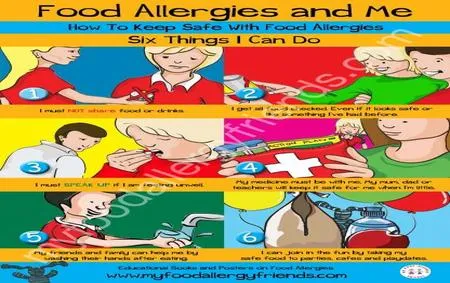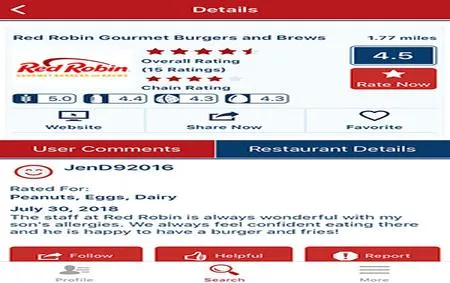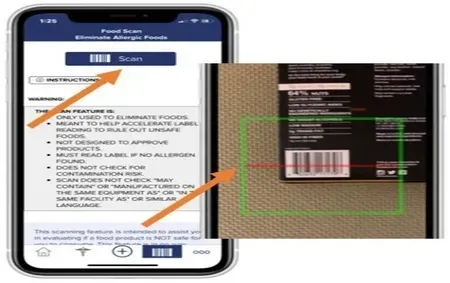The best 10 Allergy Apps
Allergy apps are digital tools designed to help individuals manage allergies by providing information, tracking symptoms, and offering personalized recommendations. These applications can assist users in identifying allergens in foods, medications, and environmental factors, making it easier to avoid triggers and maintain a safer lifestyle. Many allergy apps also enable users to connect with healthcare providers, share their experiences, and access educational resources.
In today's health-conscious environment, the importance of allergy management cannot be overstated. With rising rates of allergies, particularly among children, these apps serve as essential companions for those affected. Most allergy apps feature ingredient scanners that allow users to scan product barcodes for allergen information, empowering them to make informed dietary choices while grocery shopping. Additionally, many of these applications include symptom tracking capabilities, enabling users to log reactions and identify patterns over time. This data can be invaluable for both users and healthcare providers when developing personalized management plans. Furthermore, some allergy apps offer community features, connecting users with others who share similar experiences, fostering support and sharing of tips on living with allergies. As technology continues to evolve, allergy apps are increasingly incorporating artificial intelligence and machine learning to enhance their recommendations, making them even more effective tools for allergy management. Overall, these apps are transforming the way individuals approach their allergies, offering a blend of convenience, education, and community support.

 View All
View AllAllergy Alert - Clear labeling, easy-to-read icons, and prominent warnings for allergens ensure safety and quick identification for consumers.

 View All
View AllMy Allergy Friend - My Allergy Friend features allergen-free recipes, personalized meal plans, and a supportive community for allergy management.

 View All
View AllAllergy Eats - Allergy Eats offers a user-friendly platform for finding allergy-friendly restaurants, featuring detailed menus and community reviews.

 View All
View AllAllergyPal - AllergyPal offers personalized allergen tracking, meal suggestions, community support, and emergency alerts for allergy management.

 View All
View AlliPIE - The most attractive iPIE features include customizable flavors, fresh ingredients, eco-friendly packaging, and a convenient, portable design.

 View All
View AllFood Allergy Scanner - The Food Allergy Scanner features real-time ingredient scanning, allergen database, personalized alerts, and user-friendly mobile app integration.

 View All
View AllSnack Safely - Snack Safely offers allergen-free snacks, ensuring safety for those with food allergies and dietary restrictions.
 AllergySafeView All
AllergySafeView AllAllergySafe - AllergySafe offers hypoallergenic materials, advanced filtration, customizable settings, and user-friendly controls for optimal air quality.

 View All
View AllAllergy Insights - Allergy Insights offers personalized allergy management, real-time symptom tracking, expert advice, and tailored treatment recommendations.

 View All
View AllMyFoodAllergy. - MyFoodAllergy offers personalized allergy alerts, ingredient scanning, recipe suggestions, and community support for safe eating experiences.
The best 10 Allergy Apps
1.
Allergy Alert
Pros
Enhanced allergy awareness
improved safety
personalized alerts
easy ingredient tracking
quick access to information
peace of mind
reduced risk of allergic reactions
user-friendly interface.
Cons
Limited food options
potential for cross-contamination
constant vigilance required
social limitations
anxiety in unfamiliar settings
risk of severe reactions
misunderstandings from others.
2.
My Allergy Friend
Pros
Personalized allergy management
comprehensive allergen information
meal planning assistance
user-friendly interface
real-time updates
community support
educational resources
increased confidence in food choices
enhanced quality of life.
Cons
Limited product range
potential inaccuracies in allergy information
subscription costs
reliance on user-generated content
possible delays in updates
not a substitute for professional advice.
3.
Allergy Eats
Pros
Discover safe dining options
find allergy-friendly restaurants
access user reviews
connect with a supportive community
enhance dining confidence
and improve overall eating experiences.
Cons
Limited restaurant options
user-reported inaccuracies
potential for outdated information
reliance on user input
may not cover all allergies
can be regionally restricted.
4.
AllergyPal
Pros
Personalized allergy management
real-time food alerts
comprehensive ingredient scanning
restaurant recommendations
community support
educational resources
allergy-friendly recipes
tracking symptoms
emergency contacts
user-friendly interface.
Cons
Limited food database
potential inaccuracies in ingredient listings
reliance on user-generated content
subscription costs
may not cover all regional products
and possible technical glitches.
5.
iPIE
Pros
Enhanced learning engagement
personalized feedback
improved retention
interactive experiences
collaboration opportunities
real-time assessment
skill development
adaptability to diverse learning styles
increased motivation
accessible resources.
Cons
Limited accessibility for some users
potential technical issues
steep learning curve
reliance on internet connectivity
lack of personalization
and data privacy concerns.
6.
Food Allergy Scanner
Pros
Identifies allergens quickly
enhances food safety
promotes confidence in eating out
educates users about ingredients
customizes dietary needs
supports healthier choices
boosts peace of mind.
Cons
Inaccurate results
reliance on technology
potential for false security
limited food database
costly
not a substitute for medical advice
user error
privacy concerns.
7.
Snack Safely
Pros
Allergy-friendly recipes
ingredient safety alerts
community support
educational resources
product reviews
food recalls updates
safe snack options
allergen-free product listings
user-friendly website
mobile accessibility.
Cons
Limited product selection
potential for outdated information
reliance on user-generated content
may not cover all allergens
inconsistent labeling practices
possible subscription fees
regional availability issues.
8.
AllergySafe
Pros
AllergySafe enhances safety
reduces allergy risks
provides personalized alerts
tracks allergens
offers community support
promotes awareness
simplifies meal planning
and fosters confidence in dining experiences.
Cons
Limited availability
potential for false security
may not cover all allergens
can be costly
requires diligent usage
possible allergic reactions still occur
user compliance issues.
9.
Allergy Insights
Pros
Personalized allergy management
improved quality of life
enhanced symptom tracking
access to expert resources
community support
tailored recommendations
increased awareness of triggers
real-time updates.
Cons
Limited accuracy in allergy predictions
potential over-reliance on technology
may not account for all environmental factors
requires regular updates
can be costly for some users.
10.
MyFoodAllergy.
Pros
Personalized allergy management
real-time allergen alerts
community support
easy recipe sharing
educational resources
food labeling guidance
safe dining options
symptom tracking
emergency preparedness.
Cons
Limited food options
potential social isolation
increased meal preparation time
anxiety over cross-contamination
reliance on labels
potential for miscommunication
higher grocery costs
emotional stress.
Similar Topic You Might Be Interested In
- The best 10 Apps for Anxiety
- The best 10 Mental Health Tools
- The best 10 Calorie Counting Apps
- The best 10 Fertility Apps
- The best 10 Diabetes Tracking Apps
- The best 10 Cooking Apps
- The best 10 iPhone Navigation Apps
- The best 10 Accounting Software
- The best 10 Apps For Beer Lovers
- The best 10 Apps For Gluten Free Living